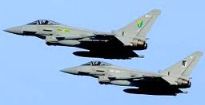Security Council Approves Libya No Fly Zone
The United Nations Security Council voted Thursday to authorize military action, including airstrikes against Libyan tanks and heavy artillery and a no-fly zone, a risky foreign intervention aimed at averting a bloody rout of rebels by forces loyal to Col. Muammar el-Qaddafi.
After days of often acrimonious debate, played out against a desperate clock, as Colonel Qaddafi’s troops advanced to within 100 miles of the rebel capital of Benghazi, Libya, the Security Council authorized member nations to take “all necessary measures” to protect civilians, diplomatic code words calling for military action.
Diplomats said the resolution — which passed with 10 votes, including the United States, and abstentions from Russia, China, Germany, Brazil and India — was written in sweeping terms to allow for a wide range of actions, including strikes on air-defense systems and missile attacks from ships. Military activity could get under way within a matter of hours, they said.
Benghazi erupted in celebration at news of the resolution’s passage. “We are embracing each other,” said Imam Bugaighis, spokeswoman for the rebel council in Benghazi. “The people are euphoric. Although a bit late, the international society did not let us down.”
There was no immediate comment from the Libyan government. But the vote, which came after rising calls for help from the Arab world and anguished debate in Washington, left unanswered many critical questions about who would take charge, what role the United States would play and whether there was still enough time to stop Colonel Qaddafi from recapturing Benghazi and crushing a rebellion that had once seemed likely to drive him from power. After the vote, President Obama met with the National Security Council to discuss the possible options, European officials said.
Speaking on a radio call-in show in Tripoli on Thursday, Colonel Qaddafi raised the level of urgency on the vote, saying that his forces would begin an assault on Benghazi that night.
“We will come house by house, room by room. It’s over. The issue has been decided,” he said, offering amnesty to those who laid down their arms. To those who continued to resist, he vowed: “We will find you in your closets. We will have no mercy and no pity.”
“It’s going to be tougher to stop Qaddafi today than it was a week ago,” said James M. Lindsay, the director of studies at the Council on Foreign Relations. “The issue is not going to be settled in the skies above Benghazi, but by taking out tanks, artillery positions and multiple-launch rocket systems on the ground.”
Mr. Lindsay said that would require helicopter gunships and other close-in support aircraft rather than advanced fighter planes. Other analysts said repelling Colonel Qaddafi’s forces might require ground troops, an option that has been flatly ruled out by Secretary of State Hillary Rodham Clinton and other senior American officials.
A Pentagon official said Thursday that decisions were still being made about what kind of military action, if any, the United States might take with the allies against Libya. The official said that contingency planning continued across a full range of operations, including a no-fly zone, but that it was unclear how much the United States would become involved beyond providing support.
That support is likely to consist of much of what the United States already has in the region — Awacs radar planes to help with air traffic control should there be airstrikes, other surveillance aircraft and about 400 Marines aboard two amphibious assault ships in the region, the Kearsarge and the Ponce.
Click here to read more.


